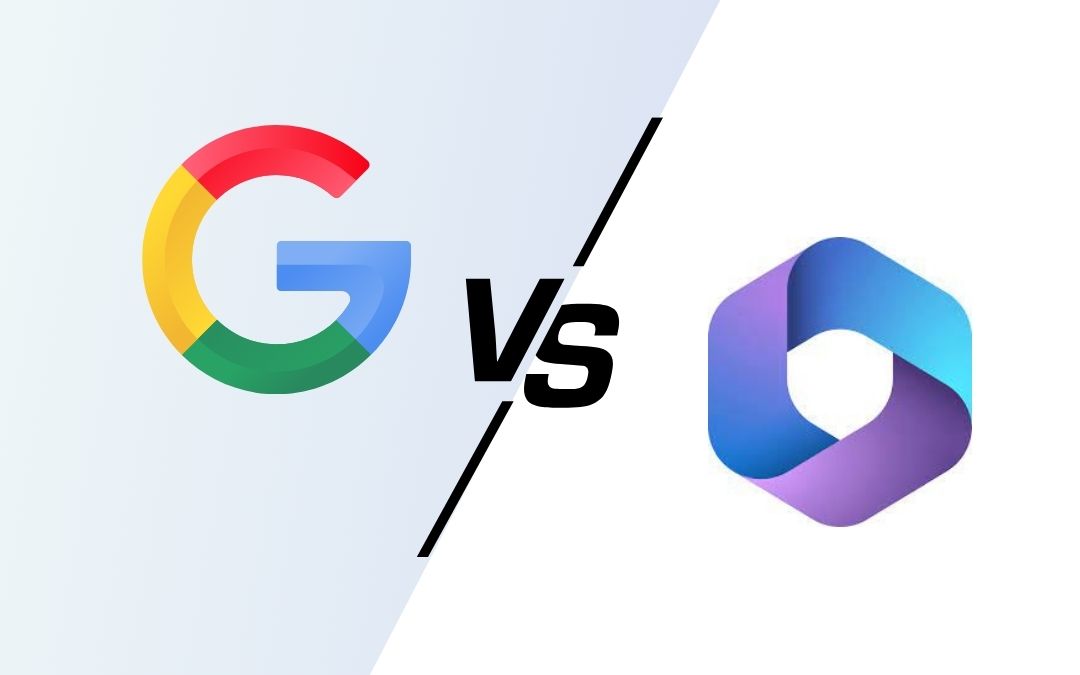
When it comes to choosing the right infrastructure for your business, few decisions carry as much weight as selecting between two industry giants: Google and Microsoft. Both companies offer powerful platforms that cater to a wide range of needs, from startups seeking scalable solutions to enterprises relying on legacy systems.
This discussion isn’t just about picking a name—it’s about identifying which infrastructure aligns best with your business goals, operational workflows, and future growth.
In this article, we’ll dive into what each platform brings to the table, compare their key features, and explore whether a mix-and-match strategy could work for your business.
Understanding the infrastructure landscape
What does Google offer?

Google’s infrastructure is built on innovation and scalability. At the heart of its offerings is Google Cloud Platform (GCP), designed to handle workloads at internet scale. Businesses can leverage GCP’s advanced capabilities, such as machine learning tools and robust data analytics, to tackle modern challenges.
Additionally, Google’s Workspace (formerly G Suite) provides seamless collaboration tools like Gmail and Google Drive, ideal for businesses prioritizing real-time teamwork and accessibility.
What does Microsoft offer?
Microsoft’s infrastructure solutions are deeply rooted in enterprise needs. Its flagship product, Azure, provides a comprehensive cloud platform with unmatched support for hybrid environments. Azure enables businesses to blend on-premises systems with cloud resources, ensuring flexibility without abandoning legacy setups.
Microsoft’s Office 365 suite and tools like Windows Server cater to companies looking for integrated productivity and infrastructure solutions. Security and compliance are also pillars of Microsoft’s offerings, with numerous certifications and advanced threat protection measures to meet the needs of highly regulated industries.
Feature-by-feature comparison (table)
When it comes to choosing between Google and Microsoft, breaking it down by specific features can highlight which platform is better suited to your business needs.
| Feature | Microsoft | |
| Scalability and performance | GCP is renowned for its ability to handle massive workloads, making it a top choice for businesses experiencing fast growth or requiring high-performance analytics. | Azure offers consistent performance across hybrid and cloud environments, ideal for enterprises with complex setups. |
| Security and compliance | GCP emphasizes modern security measures, such as end-to-end encryption and user identity management. | Azure leads in enterprise-grade security, with an extensive list of compliance certifications and advanced threat protection tools. |
| Integrations and ecosystem | Collaboration is at the core of Google’s ecosystem, with Workspace tools integrating seamlessly. GCP also provides strong support for cloud-native applications through Kubernetes. | Azure’s ecosystem integrates deeply with Office 365, Dynamics, and Windows Server, providing significant advantages for enterprises already invested in Microsoft tools. |
| Pricing and flexibility | Standard Storage: ~£0.015/GB/month Nearline Storage: ~£0.008/GB/month Coldline Storage: ~£0.005/GB/month Archive Storage: ~£0.003/GB/month Free Tier: Includes $300 (~£240) in credits for new users, ideal for startups and small businesses. | Hot Storage: ~£0.014/GB/month Cool Storage: ~£0.008/GB/month Archive Storage: ~£0.001/GB/month Free Tier: Includes 5 GB of free storage for the first 12 months. Azure Hybrid Benefit offers discounts for UK businesses using Windows Server licenses. |
Real-world use cases: Which is better for your needs?
For businesses navigating their IT infrastructure options, choosing between Google and Microsoft often depends on operational needs. Lets take a closer look at some typical use cases for context:
When Google is the better choice
- Niche use cases and innovation: While Google solutions are less common among our clients, they are well-suited for specific needs, such as advanced data analytics or AI-driven projects. Google Cloud Platform’s tools, like BigQuery and TensorFlow, are a great fit for businesses experimenting with cutting-edge technologies or focusing on innovation.
- Collaborative and distributed teams: Google Workspace tools, such as Google Docs, Drive, and Meet, shine in real-time collaboration, particularly for remote teams or businesses with younger, tech-forward teams. That said, we often see these tools being used alongside, rather than replacing, Microsoft’s productivity solutions.
When Microsoft is the better choice
- The productivity standard: Microsoft tools remain the cornerstone of our clients’ operations. For most businesses, tools like Office 365, Excel, and Outlook are familiar, reliable, and essential for day-to-day tasks. They’ve been the foundation of workplace productivity for decades, making them an easy and natural choice.
- Cost-effective and value-driven: Microsoft’s licensing structures, hybrid benefits, and overall affordability make it a go-to option for businesses looking to maximize their budgets. Many of our clients appreciate the clear value and cost efficiency that Microsoft brings to the table.
- Seamless hybrid and legacy integration: Azure’s ability to integrate with existing on-premises systems and legacy infrastructure is a huge advantage. For many businesses, this capability enables them to modernize without a full-scale overhaul, striking the right balance between innovation and continuity.
- Trusted for compliance: For clients in regulated industries, like healthcare, finance, or government, Microsoft’s extensive compliance certifications and robust security tools provide confidence and peace of mind.
Can you mix & match?
Combining Google and Microsoft infrastructure is a strategic move for many businesses. Known as a multi-cloud strategy, this approach allows you to leverage the unique strengths of each platform while reducing risks associated with relying on a single provider.
Benefits of mixing Google and Microsoft
- Cost optimization: Choose the most cost-effective platform for specific workloads, such as using Google’s pay-as-you-go model for analytics while leveraging Microsoft’s licensing benefits for productivity tools.
- Leveraging complementary strengths: Google Cloud excels in advanced data analytics and AI, while Microsoft Azure offers seamless hybrid cloud integration and strong enterprise support. Together, they create a versatile ecosystem.
- Improved resilience: Relying on multiple platforms ensures that outages in one won’t disrupt your entire infrastructure.
- Flexible growth: Mixing platforms allows your business to adapt to changing needs, whether scaling operations or introducing new tools.
Challenges to consider
- Complexity in management: Operating multiple platforms requires expertise, as managing both ecosystems can be challenging without the right skills or tools.
- Integration hurdles: Ensuring smooth communication between GCP and Azure can involve additional effort, such as setting up APIs or middleware to connect systems.
- Consistency in security and compliance: Managing security protocols across multiple platforms takes careful planning to avoid gaps or inconsistencies.
And navigating these challenges is where we come in.
Our team specialises in simplifying multi-cloud management, streamlining integrations, and ensuring robust security and compliance frameworks, so you can focus on growing your business without worrying about the complexities of a mixed infrastructure.
Contact us today to discuss your needs.
How to choose the right platform for your business
Deciding between Google, Microsoft, or a mix of both requires understanding your business needs and priorities. Here’s a simple guide:
Key questions to ask:
- What are your infrastructure goals? Are you scaling rapidly, improving collaboration, or modernizing legacy systems?
- Do you have existing tools and systems? Businesses already invested in Microsoft tools may find Azure a better fit, while Google Workspace users may prefer GCP.
- What are your compliance needs? Microsoft is a strong choice for regulated industries, while Google suits modern, cloud-first businesses.
How Operum Tech can help
Operum Tech specializes in assessing your infrastructure, identifying goals, and designing tailored solutions. Whether you’re deciding between Google, Microsoft, or both, we’ll guide you through the decision-making process and help implement the best solution for your needs.
Making the right choice
Google and Microsoft both offer exceptional infrastructure solutions, each with unique strengths. The right choice depends on your business requirements, whether it’s scalability, hybrid capabilities, or advanced analytics. For many, a combination of the two provides flexibility and performance.
At Operum Tech, we’re here to help you navigate these decisions. From assessing your systems to implementing a multi-cloud strategy, we ensure you get the most out of your infrastructure investments.
Contact us today to learn how we can support your journey toward a future-ready IT environment.
Sign up below to join the Operum newsletter



